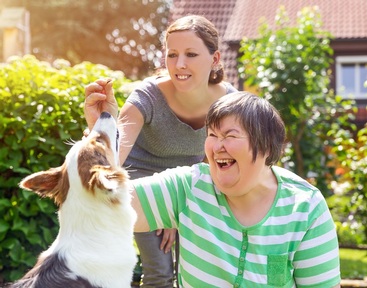CQC finds 27% people with learning difficulties and autism more likely to accept lower standard of care
Just over a quarter of people with a learning disability and autism are more likely to accept health and social care providers offering a lower standard of care as a result of coronavirus, according to research by the Care Quality Commission.

People told CQC how they ended up experiencing restrictive practices because care hadn’t been provided at the right stage, in the right way. They often reached out for help in the community and didn’t receive it, or the help they received did not meet their needs.
In response to the survey, CQC has launched a Because We All Care campaign with a focus encouraging people with a learning disability and autism, their families, friends, and care workers to give feedback and experiences on their care to CQC.
’It is so important to hear their voices’
Debbie Ivanova, the deputy chief inspector of Adult Social Care is leading a new programme of work to transform the way they regulate services for people with a learning disability and/or autism.
Ms Ivanova said: “Listening to the lived experience of people with a learning disability and/or autistic people has to be at the centre of how we decide to regulate and improve care. It is so important to hear their voices and allow our approach to be shaped by this in order to properly address the challenges of closed cultures and inadequate care.
“Families and people with lived experience keep telling us that it’s so much harder to speak up in services that care for people with a learning disability or autistic people, and we’ve recognised this. The work I am leading will be about improving the way we can hear from people and making sure that their experiences drive the action we take.”
CQC released a report in October 2020, ‘Out of Sight - who cares?’ – it found many people with a learning disability and or autistic people are still being looked after in unsuitable hospital environments, and some are subject to high levels of restrictive practice.
CQC found 66 people they met had been let down by the health and care system. Creating a package of care to meet their individual needs was often seen as too difficult to get right and they had fallen through the gaps.
They also found getting the care and support in the community when people needed it started at a young age. This ranged from families not having the right support to help them care for their children at home when they first felt extra help was needed, to not having specialist support in a crisis. Some people had waited too long, sometimes years, to get a diagnosis of autism. Even when people were diagnosed as autistic, families said they did not get the care and support they needed from health, social care and education agencies.
In their report, CQC recommends:
• People with a learning disability and or autistic people who may also have a mental health condition should be supported to live in their communities.
• People who are being cared for in hospital in the meantime must receive high-quality, person-centred, specialised care in small units. This means the right staff who are trained to support their needs supporting them along a journey to leave hospital.
• There must be renewed attempts to reduce restrictive practice by all health and social care providers, commissioners and others. We have seen too many examples of inappropriate restrictions that could have been avoided. We know in absolute emergencies this may be necessary, but we want to be clear – it should not be seen as a way to care for someone.
• There must be increased oversight and accountability for people with a learning disability, and or autistic people who may also have a mental health problem. There must be a single point of accountability to oversee progress in this policy area.
'Our own research suggests two in three autistic adults don’t get the support they need'
Tom Purser, head of campaigns at the National Autistic Society says: “The CQC’s Out of Sight report last year found many shocking examples of undignified care. And our own research suggests two in three autistic adults don’t get the support they need.
“The care system needs urgent and properly funded reform. This must be informed by autistic people and their families’ experiences of health and social care services. We encourage people to share their feedback, good or bad, with the CQC.”
People can give feedback on their experiences of care, or those of someone they care for, on the CQC website or through their local Healthwatch.
Local Healthwatch organisations can also help you with advice and information to access the support you need.
To access the Healthwatch survey, go to: https://www.healthwatch.co.uk/tell-us-about-your-experiences-nhs-and-social-care-services
To access the CQC survey, go to: https://www.cqc.org.uk/give-feedback-on-care
Latest News
 29-Jul-24
Dementia Bus gives carehome.co.uk staff insight into life with dementia
29-Jul-24
Dementia Bus gives carehome.co.uk staff insight into life with dementia
 01-Mar-24
Find out the top care homes in 2024
01-Mar-24
Find out the top care homes in 2024
 21-Mar-23
UK's top care homes in 2023 revealed
21-Mar-23
UK's top care homes in 2023 revealed
 03-Jan-23
carehome.co.uk launches free care helpline
03-Jan-23
carehome.co.uk launches free care helpline
 13-Dec-22
5 mins with Emily Whitehurst, chief operating officer for Constantia Healthcare
13-Dec-22
5 mins with Emily Whitehurst, chief operating officer for Constantia Healthcare